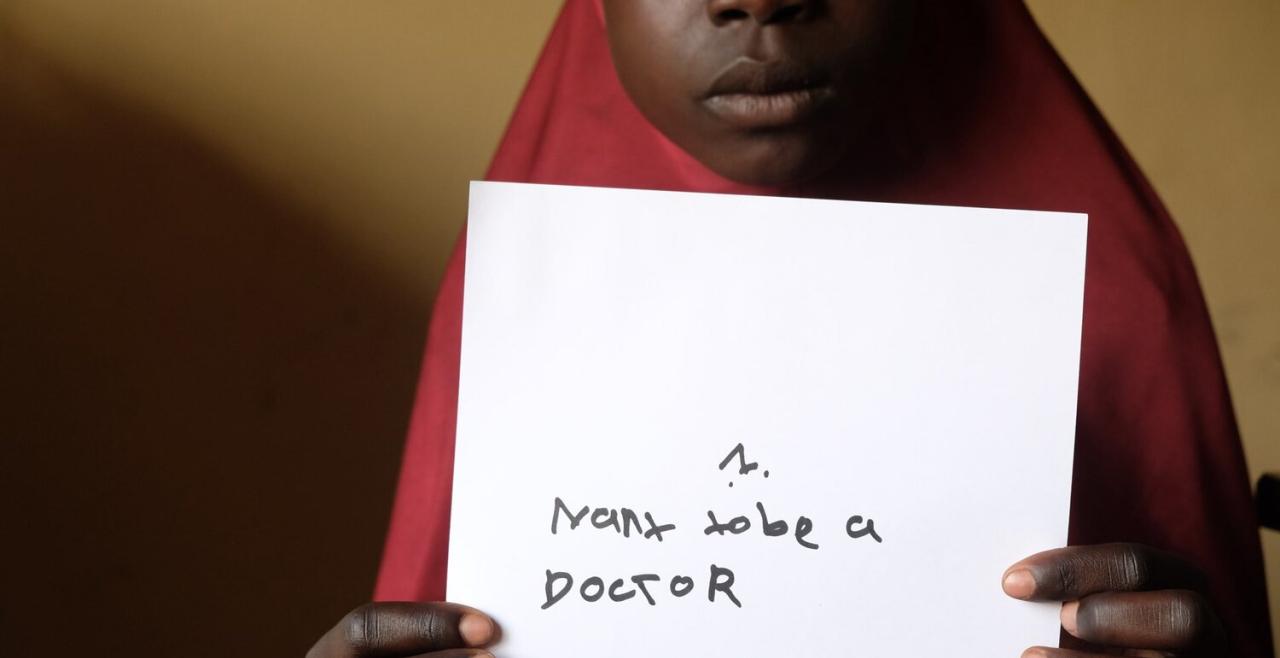Peer education: ending the cycle of violence in Nigeria

SOKOTO, Nigeria - When Aminat, 15, joined peer education sessions at her secondary school, she had already been promised in marriage to a much older man. Early marriage was common in her family and she was supposed to be married within the year. Her sister had dropped out of school a few years prior to marry and she already had two children.
After attending a few sessions, Aminat opted to be trained as a peer educator herself. She learned more about the dangers of early marriage, including increased vulnerability to violence, complications associated with giving birth at such a young age and an increased likelihood of living in poverty. "All that I heard was strange to me," she says. "I had never heard anything like that before."
When she got home, she pleaded with her parents to let her complete her education before getting married. They refused, but when she recounted her ordeal to her teacher and school principal, her parents were invited to the school for further discussions.
Three months of follow-up with Aminat’s parents convinced them of the dangers of child marriage and they agreed to let Aminat finish school. They are now hopeful that their daughter will continue her studies and become a doctor.
Nigeria, the most populous country in West Africa, accounts for 22 million of the world's child brides.
When child marriage is the norm
UNICEF describes child marriage as one of the biggest challenges to gender equality in the West-African region, with adverse effects on health, education and the overall development of girls. Nigeria, the most populous country in the region, accounts for 22 million of the world's child brides (girls married before the age of 18). Projections for the growth of child marriage remain startling, with UNICEF predicting that without urgent action, there will be 29 million child brides in Nigeria by 2050.
The Spotlight Initiative uses a peer education approach to promote favourable social norms, attitudes, and behaviours among adolescents and youth, both in and out of school. In the past year, these interventions reached more than 7300 adolescents across six states in Nigeria, with at least 400 referred to services for sexually transmitted infections (STIs), gender-based violence (GBV) or HIV treatment and prevention. Peer sessions are conducted in small groups with a trained peer educator using a manual to foster an environment where peers can learn from one another.
Every young person must make life-changing decisions about their sexual and reproductive health, peer education sessions ensure that they are ready for those times in their lives.
They also screen for cases of violence that may not be immediately obvious. During one of the in-school sessions in Abuja, a 16-year-old female student tested positive for HIV. Further counselling revealed that she had suffered physical and sexual abuse at the hands of her guardian, so the case was referred to a centre that involved the National Agency for Prohibition of Trafficking in Persons (NAPTIP) for investiagtion.
“During my youth session, one of my peers said she had been engaging in unprotected sex because her friends told her that it had no consequence" - Peer educator, Cross River
Exercising sexual and reproductive health and rights
In Cross River, one peer educator recounted that many of her peers had been unaware of the need for safe sex practices.
“During my out-of-school youth session, one of my peers said she had been engaging in unprotected sex with multiple partners because her friends told her that it had no consequence," she says. "At the end of the session on sexually transmitted Infections, she understood the dangers of having unprotected sex.”
Armed with relevant information, adolescent girls like Aminat are becoming more assertive in saying ‘no’ to early marriage and other harmful practices. Not only that, but they have the knowledge they need to make critical decisions about their health and wellbeing.
By Judith Owoicho
